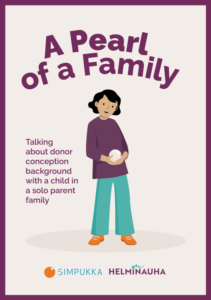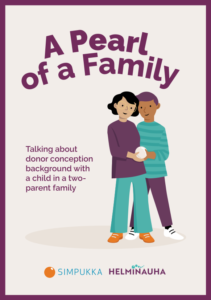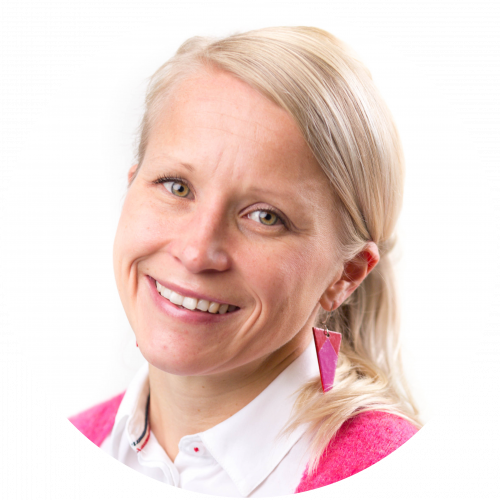In English
Table of contents
Helminauha-hanke - Pearl project
Helminauha is a project (2019-2021 + 2022-2024) funded by STEA (Funding Centre for Social Welfare and Health Organisations), the purpose is to support the families of donor-conceived children. The purpose of the project is to give information and support for parents in processing questions regarding their child’s origin as well as preparedness to talk about the donor conception background with their children. The project serves not only donor conception families but also professionals, close relatives and friends of the donor conception families, gamete donors, and those planning on donor conception. The project’s language of operation is Finnish.
Becoming a family through donor conception
What links together parents of donor-conceived children is that donated gametes have been used in their fertility treatments. The distinctiveness of donor conception families is that the children have been conceived with donated gametes so that half or all of their genes come from outside the family, from gamete donors. A donated gamete can be an egg, sperm, eggs and sperm from gamete donors or an embryo from, for example, another couple that went through fertility treatments.
The gamete donor can be known or unknown to the intended parents. In Finland, donor conception treatments executed after 2007 are being made with the help of registered donors, and the child has the right to receive the donor’s information after they turn 18. The child’s parent(s) cannot access the information of the donor.
Parenting a donor-conceived child does not differ from parenthood in general. Parents find their parenthood to be completely normal parenting and their family’s everyday life to be normal for families with small children. However, there are special qualities to a donor-conceived child that will always follow the child and therefore their parent as well.
Before undergoing treatments, people hoping for a child through donor conception should consider the following questions:
- What do you think of becoming a parent through donor conception?
- Whatdo you thinkof not knowing everything about your child’s genetics?
- If you have made the choice to use donated gametes with your partner, does your partner think the same way about the child’s genetics and the way of becoming a parent as you?
- What do you think of being open about your child’s background and that your child must grow up with knowing about their background?
Each person considering donor conception treatments goes through donor conception counselling that aims to process topics related to the treatments and donor conception parenthood through a discussion with a psychologist.
The donor conception counselling goes through the legal, ethical, and psychological aspects of donating, among other things.
Heterosexual couples, female couples and independent females have the possibility to receive fertility treatments in private fertility clinics or in university hospitals that provide fertility treatments (HUS, TAYS, TYKS, OYS and KYS).
The treatments have been available in university hospitals since 2019, please ask for more information on the criteria for the treatments from your own local hospital. Additional information on the treatments can be found on the webpages of the clinics.
Involuntary childlessness affects one in five
Involuntary childlessness affects one in five Finnish people that are in fertile age at some stage of their lives. Involuntary childlessness is always an individual experience and it involves many kinds of emotions such as sadness, longing, frustration, fluctuating hope and hopelessness. The experience of childlessness is one of the biggest crises in adulthood. Simpukka ry is the only association in Finland of involuntarily childless people that promotes the cause of involuntarily childless people.
Heterosexual couples
Heterosexual couples can ask for donor conception treatments after fertility treatments conducted with their own gametes, or donor conception treatment can also be the first and only treatment for example because of an illness.
Heterosexual couples often have a background of long-lasting childlessness and they have gone through a long and emotional journey of hope and hopelessness before moving on to donor conception treatments or before even considering the treatments. The thought of a child without a genetic connection to them can feel foreign and scary at first and fertilising your partner’s gametes with a donor’s gametes can raise many kinds of emotions. However, through donor conception treatments the couple has a chance to go through pregnancy, childbirth and being a parent from the first moments. It is understandable to have feelings of insecurity during pregnancy, such as “will I be a good enough mum or dad for this child” or “is the child completely mine”. The parents of donor-conceived children do not have the clarity of parenthood brought by the shared genetic background but above all else, parenthood is a social relationship. The meaning of genetics should not be overestimated but the child’s right to know their background and story of origin should be respected.
Rainbow families
- Female couples become parents knowing that having a child requires the use of donated gametes. The most common treatment option for female couples is insemination, in which donated sperm is injected into the woman’s uterus. IVF or in vitro fertilisation can also be a treatment option.
Questions to consider before donor conception treatments:
- What kind of emotions rise from the lack of a genetic bond, biological mother vs. social mother?
- How do you choose/How did you choose which person carries/carried the child?
- What answer to give to outsiders asking about the donor?
- Do you agree with each other in which way you will share the donor conception background with the child?
Things to discuss and agree upon:
- Custody related matters
- Acknowledgement of paternity or lack thereof
- The roles of the parents and how you wish to be called
- Creating a letter of intent, i.e. a written contract
Sateenkaariperheet ry (Rainbow Families Finland) offers more information and support for rainbow families, find out more here.
Solo mothers
A solo mother is a woman who, either out of their own wish or despite their wish, does not have a partner. A person hoping for a child independently has often decided to start the fertility treatments alone as a result of a long consideration.
Single women execute donor conception through either insemination, in which case they use donated sperm, or through IVF or in vitro fertilisation in which case they use donated sperm and the woman’s own eggs or possibly donated eggs.
Things to consider for solo mothers
Sufficient financial security
Is your income sufficient to provide for two people and for the surprise expenses that children bring? Do you feel like your financial situation is secure and sufficient?
Support network
Do you have enough friends and relatives that can support you and help with taking care of the child? Think in advance of who can take care of your child if you get sick, are on a business trip or need some alone time and rest.
Wish for a child
You want a child more than you want to keep looking for a partner. The wish for a child stems from yourself and you are not trying to fulfil other people’s wishes, such as your parents’ wishes for a grandchild.
Väestöliitto, the Family Federation of Finland’s webpages were used as resource material for the list.





